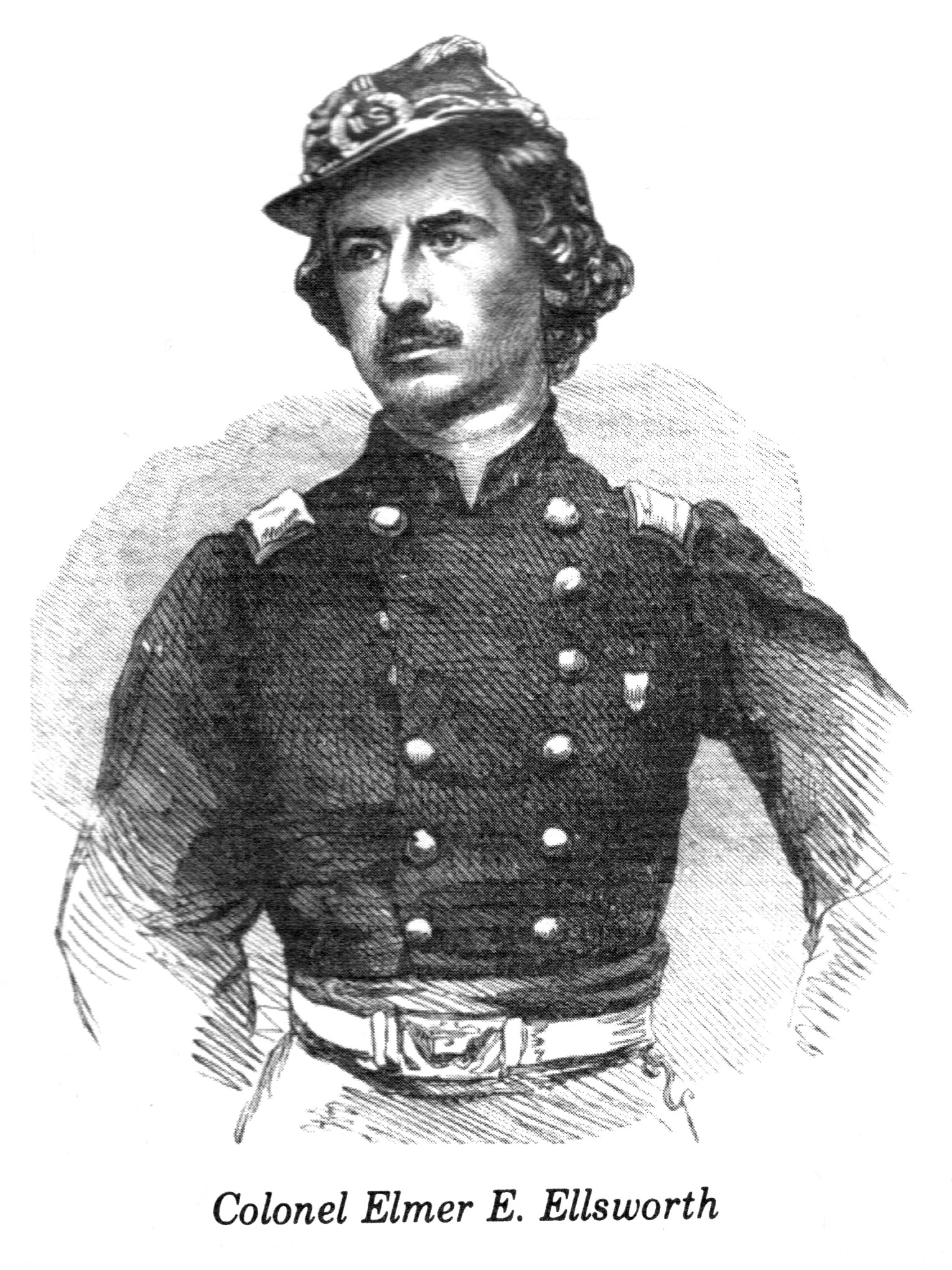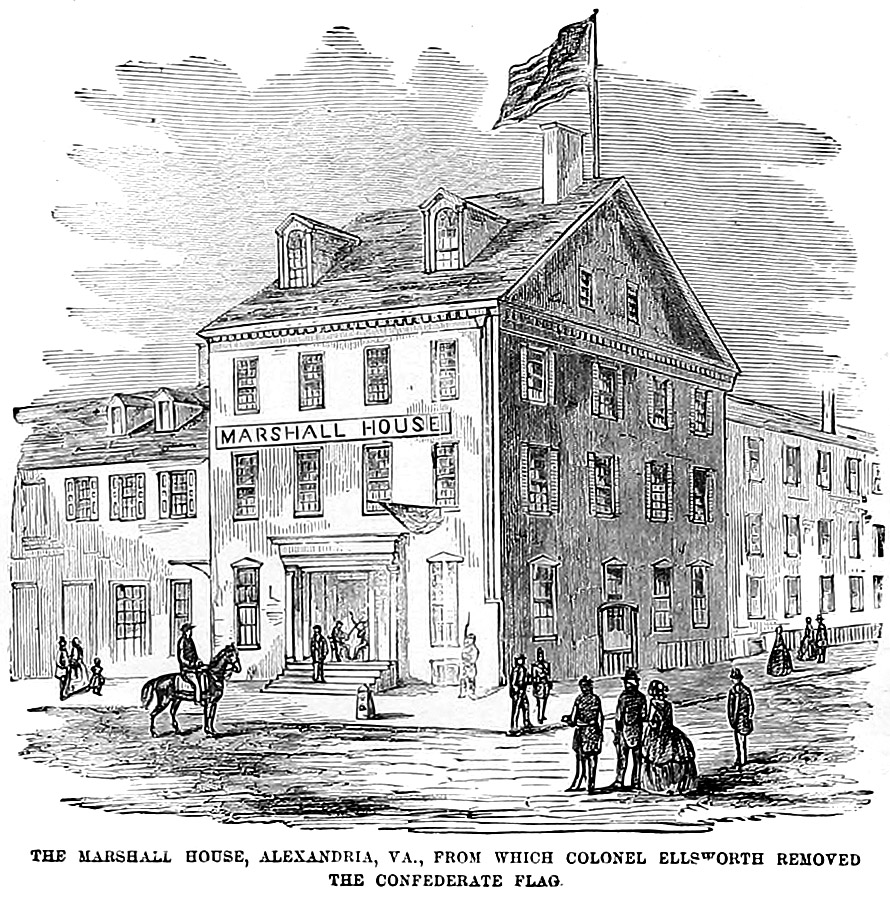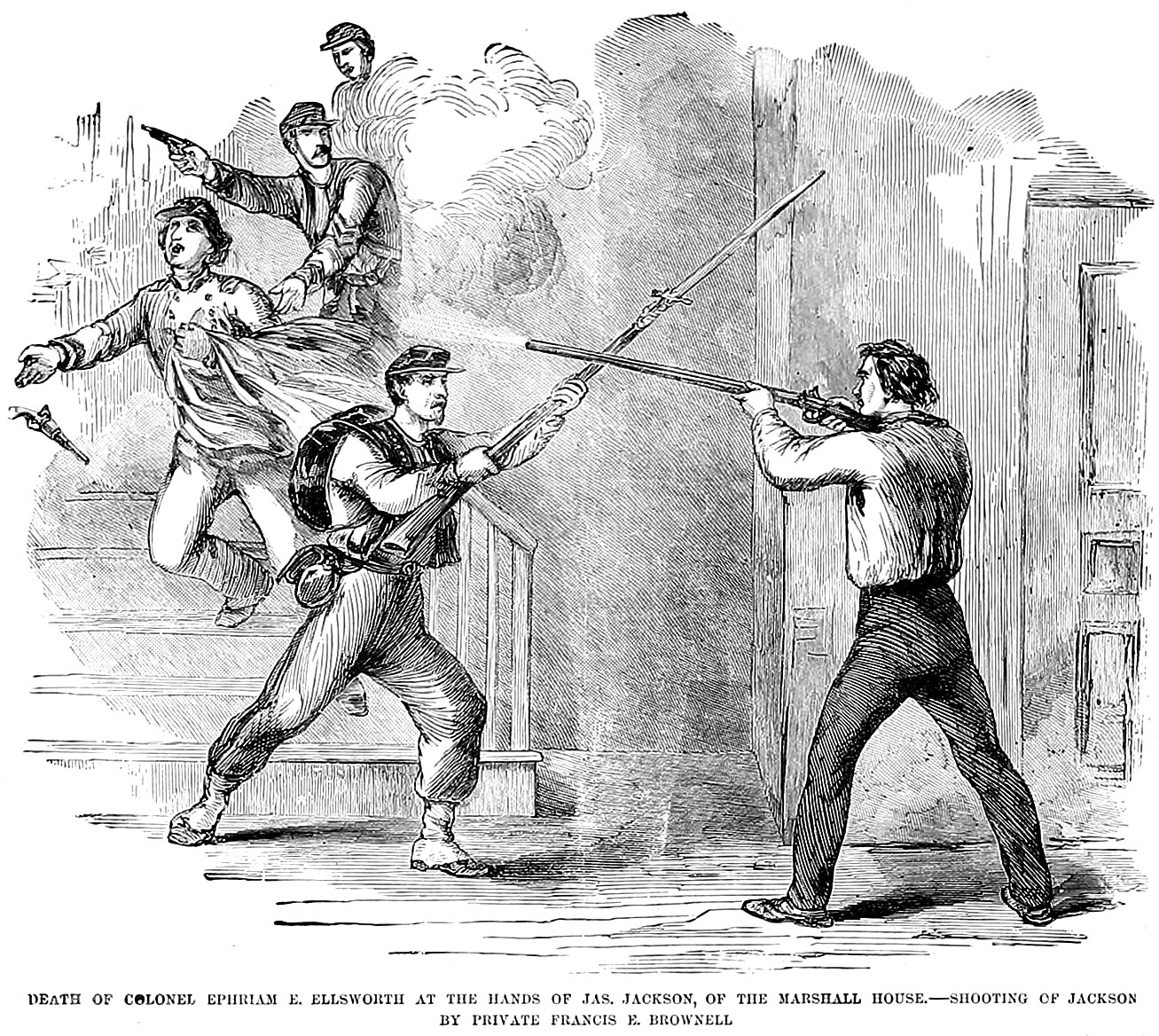Col. Elmer Ellsworth and The Marshall House Incident
Fort Ward Museum 4301 West Braddock Road, Alexandria, virginia, 22304
Perhaps no other name sparked the imaginations and patriotic fervor of Northerners in the early days of the Civil War as that of Col. Elmer Ephraim Ellsworth. His pre-Civil War fame as the leader of the Chicago Zouave Cadets popularized the Zouave movement in America, and awakened interest in the military at a time when the country was on the brink of civil war. Ellsworth's dedication to the Union cause led him to raise the first volunteer regiment in the North. Yet his death at the Marshall House in Alexandria, Virginia early in the war also claimed him as the first officer to die in the conflict, and rallied the patriotic spirit of Northerners who mourned him as a martyred hero.

Colonel Elmer E. Ellsworth
Ellsworth was born in 1837 to a working-class family in Malta, New York. From his childhood, he was fascinated by the military — eagerly listening to his great-grandfather's tales of the Revolutionary War and of George Washington who became one of his heroes. The young Ellsworth liked to draw soldiers, which anticipated his later interest in designing the uniforms of the men he commanded. Moreover, his boyhood game of organizing his playmates into companies and drilling them reflected the natural leadership abilities that won him acclaim later in life.
Like others who hoped to find fortune in the West, Ellsworth left New York at age 17 for Chicago, where he worked for a short time as a co-partner of a patentsoliciting business. The failure of this venture plunged him into several years of poverty during which he eked out a living, eventually becoming a law clerk and student. Ellsworth's law studies, however, were always half-hearted, taking second place to his growing interest and involvement in military activities.
Newspaper accounts in the mid-1850's of the daring exploits of the French Zouaves in the Crimean War especially sparked his romantic imagination. These exotic-looking troops wore colorful uniforms, North-African in origin that featured tasselled fezzes, decorative short jackets, and baggy trousers. Their elaborate drill was physically strenuous and required precise execution. It included the ability to load and fire on the run, lying down and kneeling as well as skill in the use of the bayonet. Determined to learn more about the distinctive Zouave drill and uniform, Ellsworth ordered books from France and became acquainted with a surgeon who had been in a French Zouave regiment.
His opportunity to introduce the Zouave drill to America occurred in 1858 when he became drillmaster of an Illinois volunteer militia company, the Rockford City Greys. Uniformed volunteer companies like the Greys were common in many mid-19th century cities and towns — drilling and parading for special civic occasions and ideally providing a trained army in time of war.
The popular success of the Greys' performance of the Zouave drill enabled Ellsworth to assume the command of the Chicago National Guard Cadets in 1859. Changing the unit's name to the U.S. Zouave Cadets, Ellsworth transformed the members of this disorganized and dispirited company into models of moral and military discipline. In September 1859, the Zouave Cadets won a championship competition for the best-drilled military company. This national honor led to a triumphant 20-city tour through the North, highlighted by a stunning performance at West Point, in which the Cadets thrilled audiences with the precise tactics and acrobatic feats of the Zouave drill. Although the tour secured the Zouaves and their dashing leader nationwide fame, Ellsworth's underlying purpose was to awaken a need for military preparedness at a time when the country appeared to be drifting towards war.
A personal advantage of the tour was that Ellsworth was brought to the attention of Abraham Lincoln, who described the young colonel as “the greatest little man I ever met.” Ellsworth soon established a close relationship with Lincoln and his family. He studied law in Lincoln's Springfield office for a short time, campaigned for the presidential candidate, and ultimately supervised security operations for the newly-elected president en route to Washington.
At the outbreak of war, Ellsworth returned to his home state to organize a regiment of Zouaves from the New York City Fire Department. Sworn into service in Washington as the 11th New York Regiment, the Zouaves were quartered in the Capitol building. John Hay, who was personal secretary to President Lincoln and Ellsworth's close friend, described the Fire Zouaves as “the largest, sturdiest, and physically the most magnificent men I ever saw collected together.” This physical strength and skill was soon tested when a fire broke out in the Willard Hotel on May 9, 1861. The Zouaves were quickly summoned to the scene. Ellsworth supervised the daring and gymnastic maneuvers of his men as they successfully saved the hotel from flames. A few days after this, the 11th New York moved outside Washington to Camp Lincoln on the banks of the Potomac River. Ellsworth was now arranging for his regiment to play a key role in the Union invasion of Virginia — the capture of Alexandria.
The port city of Alexandria would soon be not only a vital transportation center and supply base for the Union army, but also the site of a tragedy that would provide the North and South with its first martyred heroes. The stage for this conflict was the Marshall House, a hotel on the southeast corner of King and Pitt Streets, operated by James W. Jackson.
The youngest of seven children, James William Jackson was born in 1824 in Fairfax County, Virginia. Jackson developed the traits associated with his Southern heritage at an early age. He was a skilled horseman, an expert shot with a rifle, and an excellent boxer. In 1858, he leased the Union Hotel at Fairfax Court House where he enjoyed an active public life. When Abraham Lincoln was nominated by the Republican Party, Jackson became an ardent “Secessionist.” Shortly after he assumed the management of the Marshall House in February 1861, he had a large flag made that was patterned after the “Stars and Bars” of the Confederacy. Even before Virginia's vote of secession became effective, Jackson raised this flag over the Marshall House as a symbol of his Southern allegiance, and — in words that were prophetic — vowed to defend it with his life. This flag was reportedly so large that it could be seen from the White House in Washington. The flag had special meaning for Alexandrians on May 23, when Virginia's ordinance of secession was ratified. That evening, Jackson was among many local residents who celebrated Virginia's entry into the Confederacy.
The Federal reaction to Virginia's secession was immediate. In the early morning hours of May 24, about 13,000 Union troops were ordered to secure strategic points on the Virginia side of the Potomac. As part of this occupying force, Col. Ellsworth and the 11th New York departed for Alexandria by steamboats, and landed at the city's wharf about dawn. The small force of Confederate militia in Alexandria had already been advised to surrender or withdraw, and the town was taken without resistance as these troops evacuated by railroad to Manassas.
Upon landing, Ellsworth dispatched one company of soldiers to occupy the railroad depot. With a small entourage that included Corp. Francis E. Brownell and a correspondent from the New York Tribune, he set out to secure the telegraph office. Catching sight of the secession flag flying over the Marshall House, the determined colonel made an impetuous decision to remove it before proceeding to the telegraph office. On the roof of the building, he hauled down the flag with the assistance of his aide, Lt. H. J. Winser. Brownell led the party downstairs from the attic, followed by Ellsworth who carried the flag, Tribune reporter Edward House, and Winser. James Jackson had by now been aroused from sleep, and confronted the intruders with a double-barreled shotgun on the third landing of the stairway. Brownell instinctively diverted the innkeeper's weapon with his own rifle, but the discharge hit Ellsworth in the chest, immediately killing him. Brownell instantly fired, fatally wounding Jackson in the head. In just a few seconds, two men fell who would be hailed as martyrs for the causes they had cherished.
Ellsworth himself seems to have had a premonition of the role he would play in the Northern effort to preserve the Union. Hours before his regiment embarked for Alexandria, he addressed a prophetic letter to his parents in which he wrote: “Whatever may happen cherish the consolation that I was engaged in the performance of a sacred duty…” and that “He who noteth even the fall of a sparrow will have some purpose even in the fate of one like me…” He then adorned his uniform with a patriotic pin that bore the Latin motto: “Not for ourselves alone, but for country.” This pin was found imbedded in his chest by the fatal shotgun blast.

The Marshall House, Alexandria, Va.
Today, The Hotel Monaco stands on the former site of the Marshall House.

Death of Col. Elmer E. Ellsworth
at the Marshall House, Alexandria, Virginia,
May 24, 1861
Northern and Southern newspapers sensationalized the Marshall House incident. Northern accounts vilified the “assassin” of Ellsworth, and cheered his “avenger”. Jackson's death generated outrage in the South, where he was viewed as a patriot defending his home and private rights. These sentiments were passionately expressed in poems dedicated to Jackson such as this passage from “The Martyr of Alexandria” by James W. Simmons:
“A vow is registered in Heaven!
Patriot! 'tis thine!
To guard those matchless colors, given
By hands divine.
Jackson! thy spirit may not hear
Our wail ascend:
A nation gathers round thy bier,
And mourns its friend.”
The funeral of the 24-year-old Ellsworth was held in the East Room of the White House, and attended by the bereaved President and Mrs. Lincoln. The Zouave leader's body was then taken to New York for tributes in New York City and Albany before burial in his hometown of Mechanicville. Ellsworth's death initiated a huge commemorative movement which rallied support for the Northern cause early in the war. Enlistments soared, poems and songs were written in his memory, souvenir-seekers chipped away pieces of the Marshall House stairway where he died, and patriotic envelopes bore the slogan “Remember Ellsworth!” In Alexandria, one of the first Union forts built in the Defenses of Washington was named for him, and the 44th New York Regiment, known as “Ellsworth's Avengers,” was raised in his honor. A commemorative ballad adopted by this regiment hailed Ellsworth as “the first to fall.” One stanza of this song captures the patriotic spirit that his death generated in the North and the strong devotion he inspired in the men from his home state:
“First to fall, thou youthful martyr,
Hapless was thy fate;
Hastened we, as thy avengers,
From thy native State,
Speed we on, from town and city,
Not for wealth or fame,
But because we love the Union,
And our Ellsworth's name.”